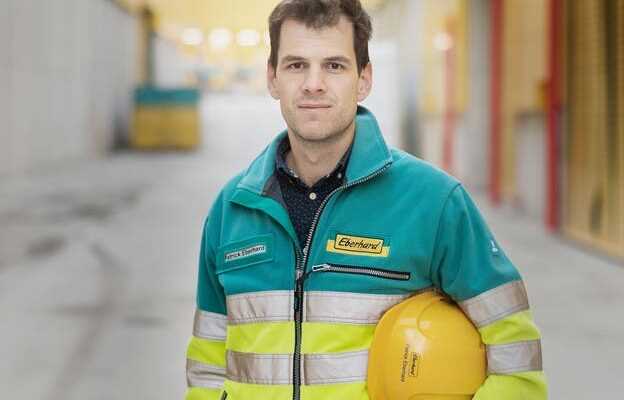When it comes to environmentally friendly building, the Eberhard company is one step ahead. The company, managed in the third generation, built the first floor washing system in Europe. The latest system uses robot technology to neatly separate construction waste. The future managing director Patrick Eberhard explains how Eberhard became a pioneer in the circular economy.
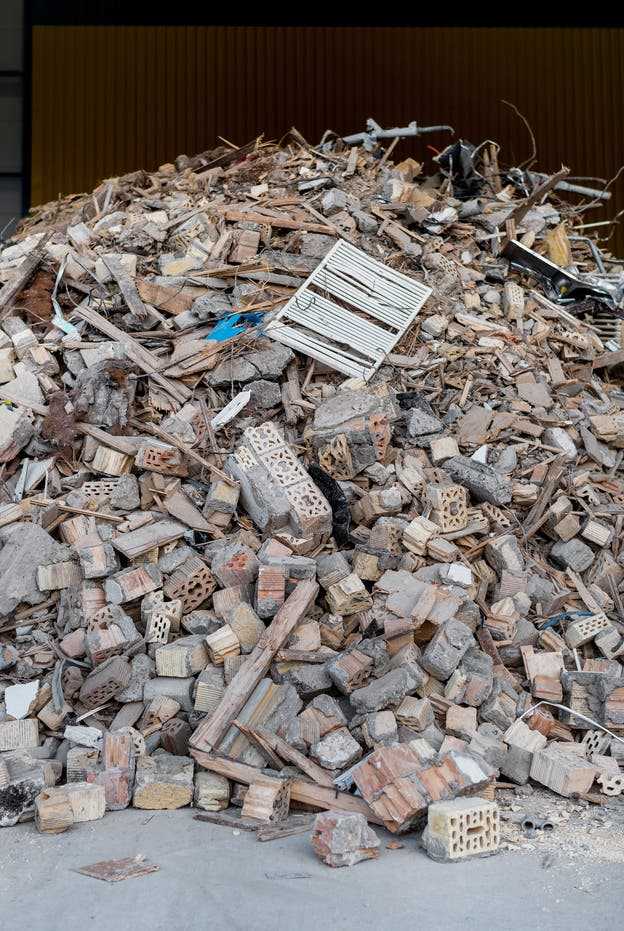
The family company Eberhard operates a recycling plant for building materials in Oberglatt. Left: the designated head of the company Patrick Eberhard. Right: Building rubble delivered is waiting to be recycled.
Patrick Eberhard still has the date: November 5, 2019. On this day, the board of directors of the Zurich construction company decided to build a new type of processing center for construction waste. the Ebimix For Eberhard, the named system meant an investment in the double-digit million range.
For the 33-year-old young entrepreneur, who, together with his four-year-old brother Silvan and his cousin Daniel, had taken over the company from the previous generation at the time, it was an enormous financial risk. But for the company founded in 1954 by Patrick’s grandfather Heiri and great uncle Ruedi, such risks were not new. The Eberhard Group, which now operates at eleven Swiss locations and has around 600 employees, had already put everything on one card several times in the past without knowing whether the bet would work.
Total risk
After the board meeting, he realized that you have to think big now. “There is no going back,” said Patrick Eberhard during a visit to this key moment. The current head of sales, who is also responsible for the company’s innovation projects, will take over management from his uncle Martin in 2024. Like their predecessors, the three new company owners took over the reins at a young age, but also had to borrow money from the previous generation. “We also have to work for the first ten years just to pay off the debts,” Eberhard explains the initial situation. “That’s why I feel an extreme pressure to succeed,” he adds.
On the other hand, he never felt any pressure to take over the family company and continue writing the company’s history. However, he believes that he has always carried the “building gene” within himself. At the age of twelve he earned his first money in construction, at an hourly wage of CHF 3.50. At sixteen he had had enough of school and became a street worker. Each of the three young company owners first learned a trade. “We all started with shovels and screws.” Patrick Eberhard later trained as a civil engineer and site manager before joining the family business in 2016.
The financial risk is considerable for the young entrepreneur and family man, whose wife is expecting their second daughter in March. But this willingness to take risks and a basic trust that it will somehow turn out well in the end seem to be typical of the Eberhard family.
Actually, the two founders would have preferred to become large farmers. But the construction of Zurich Airport thwarted these plans. Instead, as a trained locksmith, his grandfather decided to get into the excavators and construction machinery business, says Patrick Eberhard. In this way, the two of them could at least benefit in other ways from the airport construction, which put an end to their agricultural plans. The Eberhard company was involved in every subsequent expansion phase of the airport.
Things got really tight during the oil crisis in the mid-1970s. In order to make ends meet financially, the previously acquired gravel pits would have had to be sold again. Because there was too little work in Switzerland, the founders went to Saudi Arabia as subcontractors, where they worked on two huge construction sites, says Patrick Eberhard.
The old Eberhards have always been enthusiastic about the largest possible machines. The company’s fleet now includes around 250 construction machines and 70 trucks. The vehicles, which, like all of the company’s buildings, have a water-blue and yellow paintwork, are entirely owned by the company. “Nothing is leased,” emphasizes the designated head of the company.
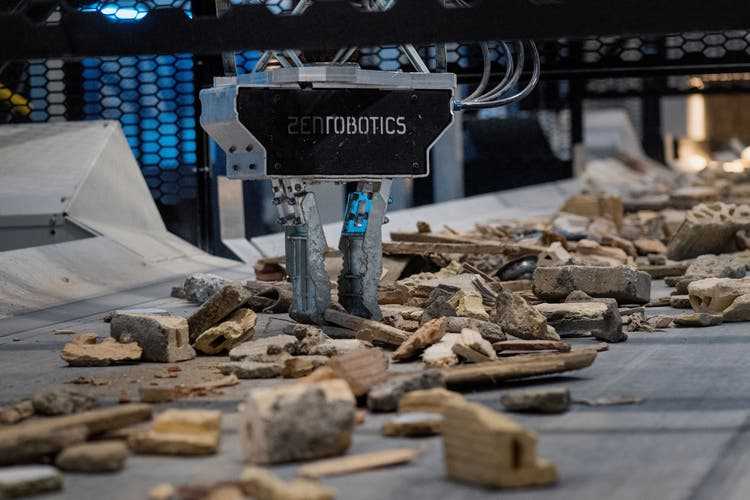
Above: A robot uses its gripper arm to pick up the foreign matter that is sorted out on the conveyor belt with rubble. Below: Hall in which a robot removes foreign matter, such as wood, from rubble.
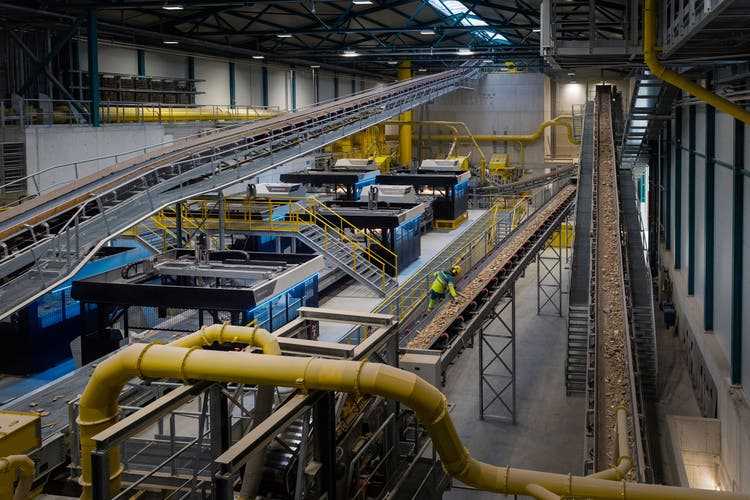
Focused on ecology from an early age
Eberhard’s specialization in ecology began in the 1980s. The trigger was the introduction of a new waste ordinance in Switzerland. Since then, contaminated soils can no longer simply be dumped. For the Eberhards, ecology means more than a catchphrase or a new business opportunity. At an early stage, they voluntarily introduced specific measures that reduce environmental pollution. Biodegradable hydraulic oil for construction machinery, soot particle filters for trucks or on-board computers for fuel-efficient driving have been around at Eberhard for decades.
So it is not surprising that the company built the first and largest floor washing plant in Europe in the early 1990s. It was so expensive that part of it had to be financed externally. When it was built, there weren’t any customers. It was only a few years later that it had its major mission through a fateful coincidence. In March 1994, a cistern car filled with gasoline exploded at Zurich Affoltern train station and set neighboring houses on fire. Many pollutants ended up in the soil. A washing plant that sifts the soiled overburden, sorts out clean stones and gravel and prepares the filter dust for cement production or safe landfill came as if called. The system called Esar is still in operation in Rümlang today.
In the years that followed, the company also built a plant that processes construction rubble in order to extract secondary raw materials from waste. There was initially no market for this either. The owners of gravel pits and quarries showed little interest in using such raw materials. Incidentally, that still applies today, adds Patrick Eberhard.
However, the lack of a customer base never prevented the company from building more such systems at their own risk. When construction began, they usually did not know what a corresponding business model should look like. “If the bare numbers had been in the foreground, we would never have done it,” says Patrick Eberhard, explaining the situation in which the recycling pioneer found himself repeatedly. The previous generation already had this characteristic of not being restricted by market conditions, but of trusting one’s own business acumen.
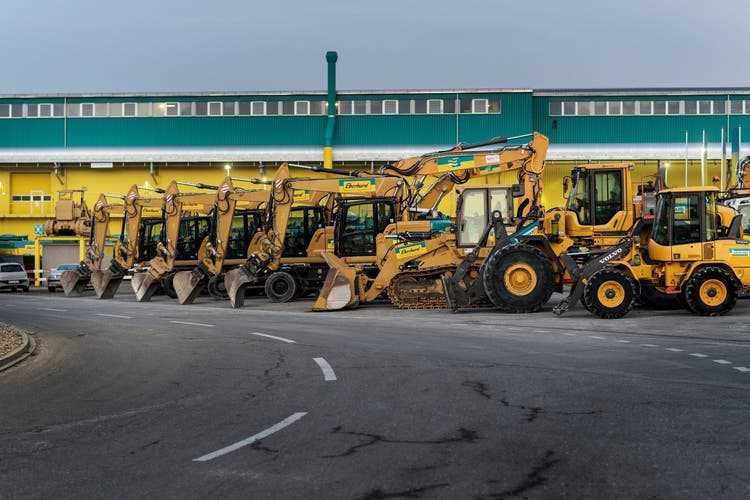
The company system, excavator and truck in the two company colors.
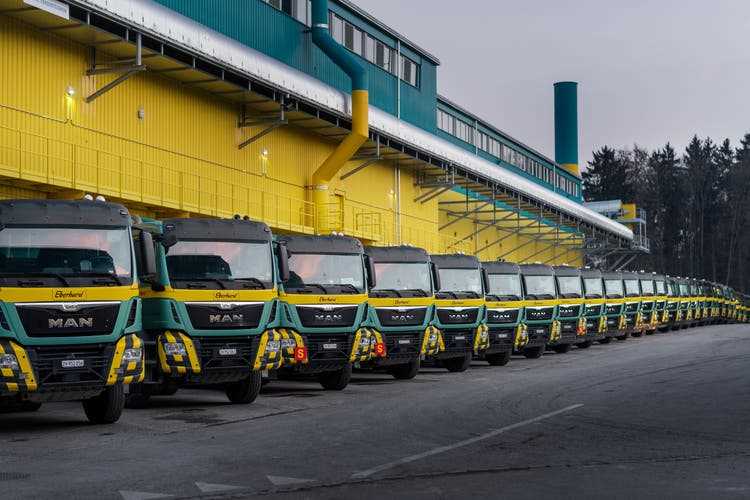
The mine in the city
It is the same with the latest construction waste plant Ebimix. It took years before the project was ready. The pilot plant was already running in 2015. The costs are enormous, because self-learning sorting robots are used to separate the mixed demolition, which sort out the foreign substances individually. After the subsequent mechanical wet process, 99 percent of the material would come out as an equivalent secondary raw material, says Eberhard. He does not want to reveal details, the system is still not running optimally. That is why around 60,000 tons of pre-sorted construction rubble are currently piling up in the huge hall. The roofs of the complex, which is spread over several buildings, are covered with solar panels, whose electricity production is used for internal use.
Ebimix could become the heart of Urban Mining. With this concept of the circular economy, the building fabric of a city is viewed as a raw material store for new buildings. Given the huge CO2-Emissions associated with cement production and construction, recycling of materials would benefit the climate. For Patrick Eberhard, Ebimix is a twenty-year bet. “Sow five years, reap fifteen years.” At least the first customers are on board, but there is still no real market for secondary raw materials.
This was also one of the reasons why Eberhard started producing concrete. With their recycled concrete, Zirkulit, which for the most part consists of secondary raw materials and even some of the CO2 can bind, be number one in Switzerland. Eberhard developed the technology himself. Per cubic meter of concrete, which usually contains around 200 kilograms of CO2 this could save around 10 kilograms. Overall, according to Eberhard, greenhouse gases could be reduced by around 10 percent with Circulit. The static properties of the concrete remained the same. And customers are willing to pay around 20 percent more for it.
Paradoxically, the usual recycled concrete, in which only about a quarter of the sand and gravel comes from secondary raw materials, performs even worse than primary concrete in terms of climate impact. This is due to the slightly higher proportion of cement. In Switzerland there is a prescribed minimum amount of 280 kilograms per cubic meter, which the circulite must also adhere to. Of course, that suits the cement manufacturers. Research is already being carried out on cement-free concrete. “The future must be a recyclable house based on minerals,” says Eberhard.
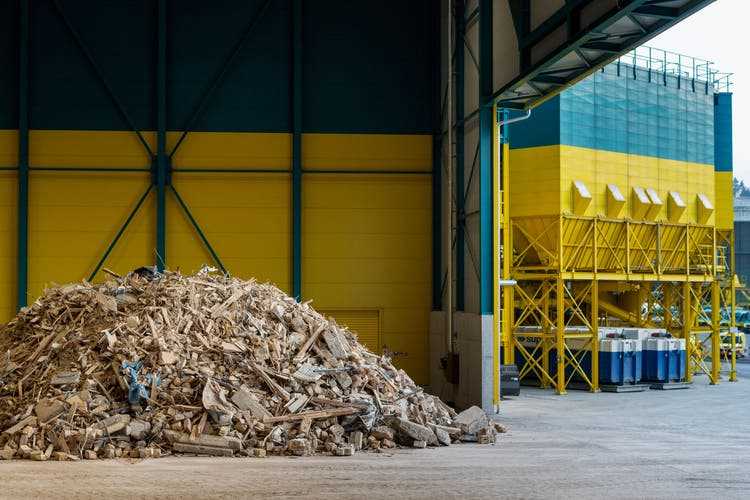
Above: rubble and silos. Below: Intermediate storage for pre-sorted gravel and sand.
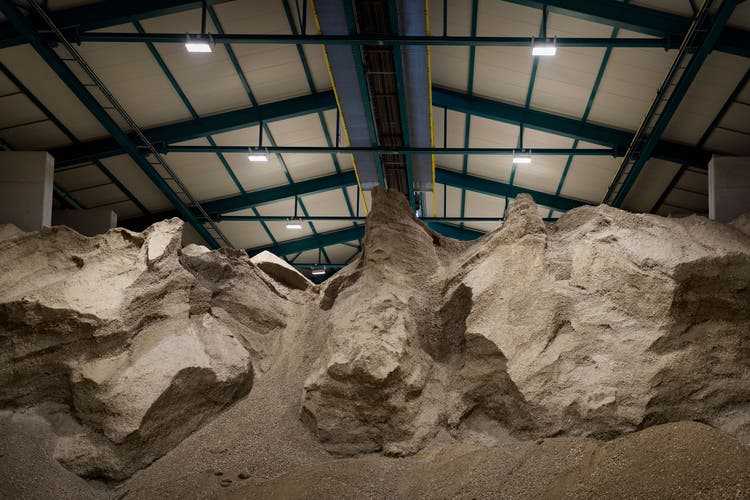
Construction industry in crisis
Eberhard’s specialization in the remediation of contaminated sites, recycling and ecological building materials is also related to the fact that the traditional construction industry has structural problems despite the building boom. According to Eberhard, the profit margins in construction are on the ground. Hardly any company has reserves; the price war is brutal. There is also an extreme shortage of skilled workers.
Patrick Eberhard says he knows what he’s talking about, he used to be a site manager and site manager himself. A system prevails on construction sites in which the mistakes of the other person are the only opportunity to pull your head out of the loop. The entrepreneur concludes that it is obvious that this culture is not the most attractive.
In addition, attempts are constantly being made to poach employees from the competitor. “Our best people receive a phone twice a month asking them whether they want to change for more wages. Even I get such offers sometimes, ”says Eberhard with a smile. Nevertheless, for him there is nothing better than building: “Where else do you see something new being created every day that generates added value for many?”
